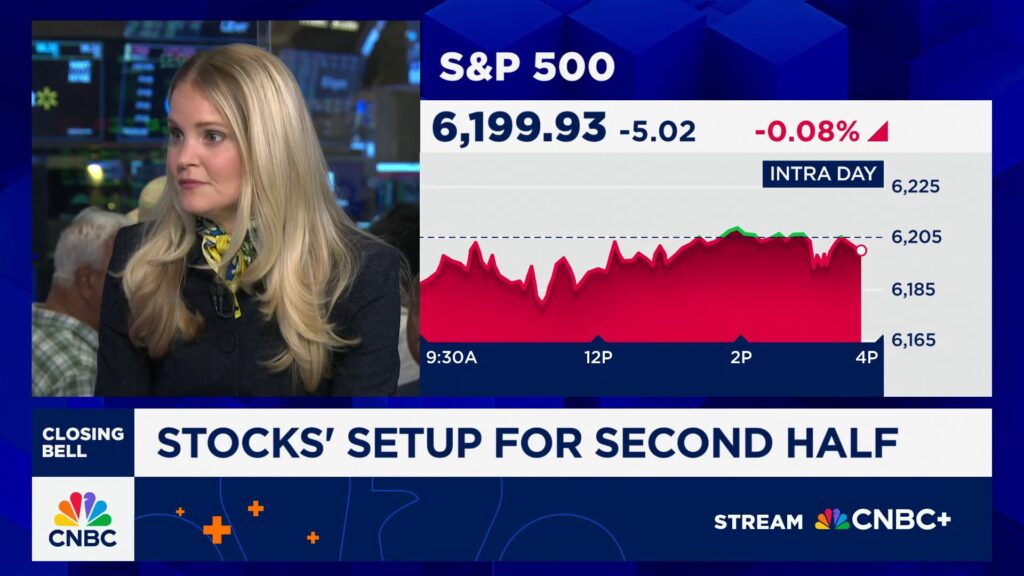Abby Yoder, the chief equity strategist at JPMorgan Private Bank, has reassured investors that the worst-case tariff scenario is now off the table. Speaking on CNBC’s ‘Closing Bell,’ Yoder addressed the current market conditions and the factors influencing investor sentiment.
The announcement comes as global markets have been on edge due to ongoing trade tensions and economic uncertainties. Yoder’s insights provided a much-needed sense of relief, suggesting that the feared escalation in tariffs will not materialize, thereby stabilizing market outlooks.
Market Reactions and Economic Implications
In recent months, markets have been volatile, reacting to news of potential tariff increases between major economies. Yoder’s statement is expected to calm investors who have been bracing for negative impacts on global trade and economic growth.
According to Yoder, the avoidance of severe tariff hikes is a positive signal for both equity markets and the broader economy. She highlighted that while some tariffs remain in place, the absence of a worst-case scenario allows businesses to plan with greater confidence.
“The removal of the worst-case tariff scenario is a significant relief for markets. It allows for a more stable investment environment,” said Abby Yoder.
Historical Context and Expert Opinions
The current trade tensions are reminiscent of past economic standoffs, such as those seen during the trade wars of the 1980s. However, experts suggest that today’s global economy is more interconnected, making the stakes higher.
Economists have noted that while tariffs can be used as a tool for negotiation, they often lead to unintended consequences, such as increased costs for consumers and disruptions in supply chains. The recent developments indicate a shift towards more diplomatic resolutions.
Dr. Alan Greenspan, former Chairman of the Federal Reserve, commented on the situation, saying, “Avoiding extreme tariff measures is crucial for maintaining economic stability. The interconnected nature of today’s global markets means that aggressive tariff policies can have far-reaching effects.”
Future Prospects and Investor Strategies
With the worst-case tariff scenario off the table, investors are now turning their attention to other factors that could influence market dynamics, such as interest rate policies and geopolitical developments.
Yoder advised investors to remain vigilant but optimistic, suggesting that diversified portfolios could benefit from the current environment. “Opportunities exist in sectors that are less affected by trade tensions, such as technology and healthcare,” she noted.
“Investors should focus on long-term growth potential and consider sectors that are poised for resilience,” Yoder added.
Looking Ahead: Economic Growth and Stability
The move represents a step towards stabilizing economic relations between major trading partners. Analysts believe that this could pave the way for renewed negotiations and potentially more favorable trade agreements in the future.
However, the global economy still faces challenges, including inflationary pressures and supply chain disruptions. Policymakers will need to balance these issues while fostering growth and maintaining stability.
As the situation evolves, market participants will be closely monitoring any developments that could impact economic forecasts and investment strategies. The focus will likely remain on maintaining open communication channels between nations to prevent further escalations.
In conclusion, while the immediate threat of severe tariffs has been averted, the global economic landscape remains complex. Investors and policymakers alike will need to navigate these challenges with caution and foresight.
About The Author
 Hidden Bias in HIV Testing Leaves Women and Older Adults at Risk in Spain
Hidden Bias in HIV Testing Leaves Women and Older Adults at Risk in Spain Federal Judge Rules HHS Layoffs Likely Unlawful, Citing Potential Harm
Federal Judge Rules HHS Layoffs Likely Unlawful, Citing Potential Harm Primo Brands Sets Date for Q2 2025 Earnings Release and Conference Call
Primo Brands Sets Date for Q2 2025 Earnings Release and Conference Call Patrick Industries to Present at CJS Securities Conference Amid Market Growth
Patrick Industries to Present at CJS Securities Conference Amid Market Growth Heart Disease Mortality Declines Overall, but Some Conditions Worsen
Heart Disease Mortality Declines Overall, but Some Conditions Worsen